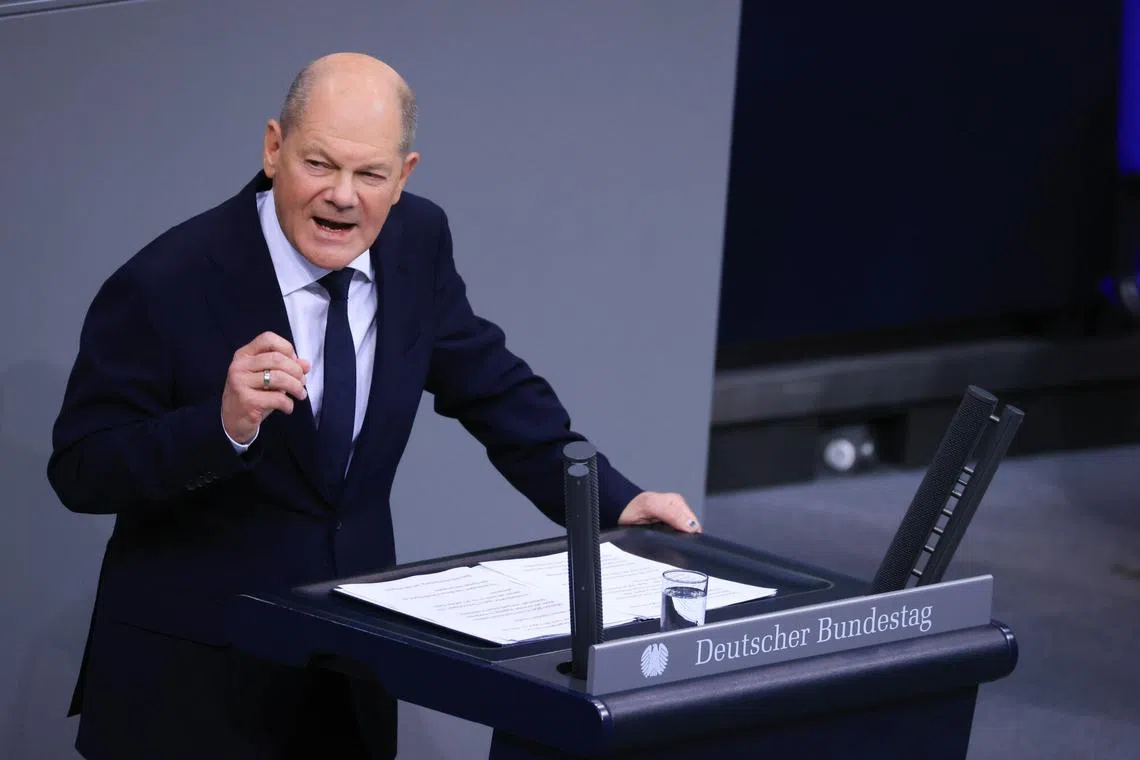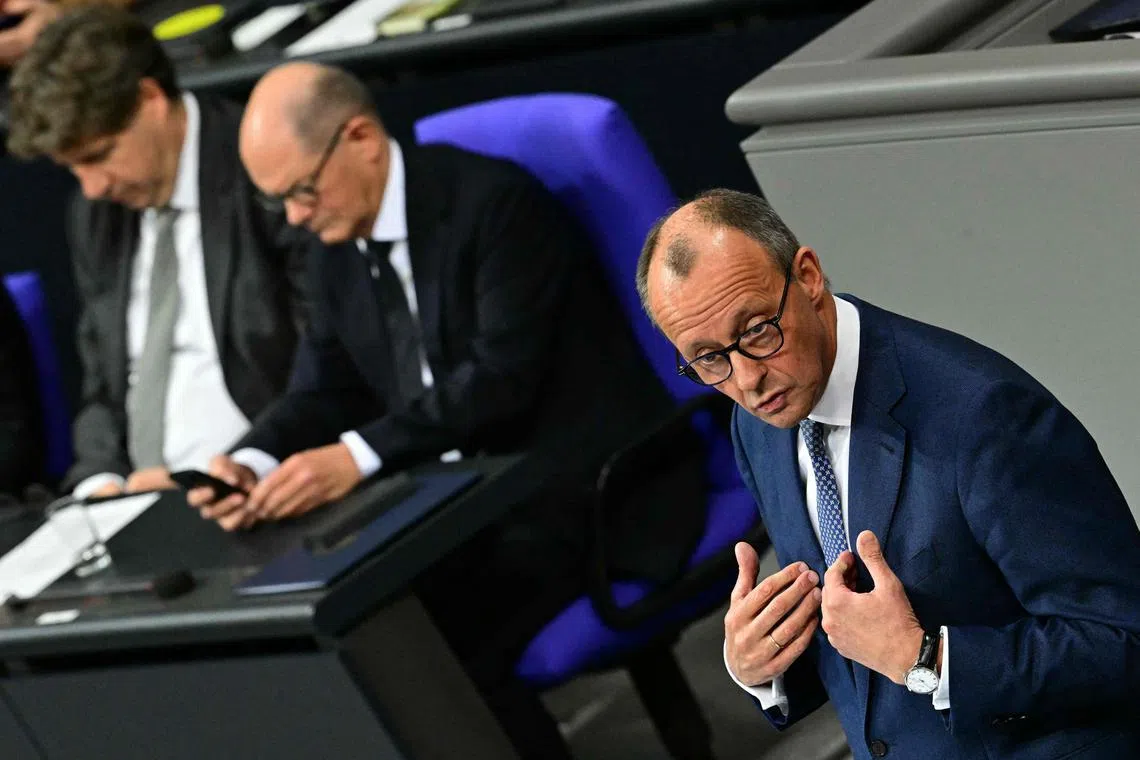News analysis
After German government’s collapse: Relief and hope for a new beginning
Sign up now: Get ST's newsletters delivered to your inbox

German Chancellor Olaf Scholz's government had already been steadily losing public support for around a year.
PHOTO: BLOOMBERG
BERLIN – Following the collapse of the government, there is now a clear road map for new elections in February 2025 – and Germany is breathing a sigh of relief.
The governing three-party coalition has struggled too much during its term in office, the centrifugal forces between Chancellor Olaf Scholz’s Social Democrats, the Greens and, above all, the pro-business Free Democrats were too great.
Mr Scholz, who was so often at a loss for words and seen as lacking in strength, had not succeeded in holding together the three diverse partners
While his centre-left Social Democrats traditionally did not want to abandon the further expansion of the welfare state, the Greens would not let go of their radical climate change policy, which came primarily at the expense of the economy and therefore met with growing resistance from the Liberals.
The so-called “traffic light” government – named for the colours of the parties in the coalition, red for the Social Democratic Party, yellow for the Free Democratic Party and green for the Greens – overwhelmed from the start by the war in neighbouring Ukraine, ultimately lacked direction. The citizens no longer knew where this government was taking the country.
While the Social Democrats and Greens wanted to take on more debt in order to finance investments in infrastructure and support for Ukraine and wanted to increase social spending, the Liberals vehemently opposed additional public debt. This impasse led to the failure to agree on a budget for 2025.
Mr Scholz fired his finance minister, Mr Christian Lindner, who heads the Free Democrats, in early November, triggering the collapse of his government.
But his government, which came to power in 2021, had already been steadily losing public support for around a year and most recently had approval ratings of only around 10 per cent. The sudden end was therefore clearly preferable to languishing until the autumn of 2025, when regular elections would have been due.
As paradoxical as it may seem at first glance because Germany is now entering a period of uncertainty, a reorganisation of the federal government is the right thing to do.
Over time, the struggling coalition government had weakened Germany’s domestic and international standing. Gridlock on key issues like economic policy, immigration and energy had fuelled support for the far-right Alternative fur Deutschland (AfD), now polling around 18 per cent and posing a threat to the country’s centrist democracy.
Economic stagnation and the lack of leadership because of a feeble chancellor diminished Germany’s role as the European Union’s economic leader, which is crucial amid the various crises, most of all the war in Ukraine.
Across the Atlantic, the upheavals that are already emerging in the United States as a result of the election of Donald Trump as president present Germany and the rest of Europe with challenges that require a stable government and leadership.
An early election might restore stability and give Germany a stronger mandate to lead in Europe, although challenges will remain.
If the opinion polls are to be trusted, the main opposition Christian Democratic Union (CDU) will clearly emerge as the strongest force in the snap elections on Feb 23, with around 35 per cent of the popular vote. The CDU usually polls at least 30 per cent in elections and its poor showing in 2021 was an exception mainly due to a hapless candidate and internal struggles.
Mr Friedrich Merz, current head of the conservative Christian Democrats and who is tipped to become chancellor, could then possibly govern with just one coalition partner and set the political and economic course much more easily.
Mr Merz, 69, is not only much more conservative than long-time CDU chancellor Angela Merkel who stepped down in 2021; he is also a businessman.
He will try to significantly reduce corporate taxes and make Germany more attractive again as an investment location by cutting back on bureaucracy and regulations. He is also likely to make the transition from a fossil-fuelled economy to a green economy more business-friendly. All this should boost growth and thus also tax revenues.

Mr Friedrich Merz (right), current head of the conservative Christian Democrats could govern with just one coalition partner and set the political and economic course much more easily.
PHOTO: AFP
A stronger German leadership will be very welcome in Europe. The Franco-German tandem, traditionally the driving force within the EU, is lacking steam also because France’s President Emmanuel Macron is embattled domestically. Mr Merz is a clear proponent of greater defence spending and a higher contribution to the Nato security alliance.
However, his starting position would be extremely unfavourable. Germany is in a recession with shrinking economic growth and key industries struggling with challenges to their business models.
The country’s gross domestic product (GDP) has grown by only 0.1 per cent
US President-elect Trump, when he takes office in January,
Trump had taken aim at Germany during his first term in office from 2017 to 2021 and repeatedly criticised Dr Merkel’s government at the time – whether it was for insufficient defence spending or the German exports to the US. All signs indicate that Trump will once again target Germany.
During Trump’s election campaign, he demanded that Nato members spend at least 3 per cent of their GDP on defence instead of the previous 2 per cent. He is threatening to impose a 10 per cent tariff on all imports from Europe. This would hit the German export industry particularly hard. The US was Germany’s most important export market in 2023, ahead of France, the Netherlands and China. Germany had a trade surplus with the US in 2023 of around €63.5 billion (S$90 billion).
According to the German Economic Institute, such tariff increases would have a noticeable impact on the country’s already weak economic growth, possibly reducing its GDP by around 0.3 per cent in 2025 and by up to 1.2 per cent in subsequent years.
On Russia’s invasion of Ukraine,
And in the event that the war comes to an end, new waves of refugees from Ukraine could lead to considerable additional burdens on the country’s social safety nets.
This would meet with a German public that is already wary of the many refugees the country has taken in – from Ukraine since 2022, but also from elsewhere including Syria, Iraq and Afghanistan.
The next German chancellor will have to negotiate this and other sensitive issues with Trump.
Domestically, issues such as the hosting of more Ukrainian refugees which will impose further burdens on the German population will face strong opposition from it. Winning Germans over is likely to require considerable political capital.
There is also another danger looming in the background: the rise of right-wing parties such as the AfD and the new populist party Bundnis Sahra Wagenknecht could continue in the coming years.
These parties are already interpreting the failure of the Scholz government as a sign of weakness of the established parties and exploiting it politically.
Mr Ralph Brinkhaus, former parliamentary group leader of the CDU, describing the situation recently, said: “The next federal government, regardless of its composition, must be successful. Otherwise, the 2029 federal election will no longer be decided between Social Democrats and Greens or conservatives and liberals, but between democrats on the one hand and populists and extremists on the other.”


